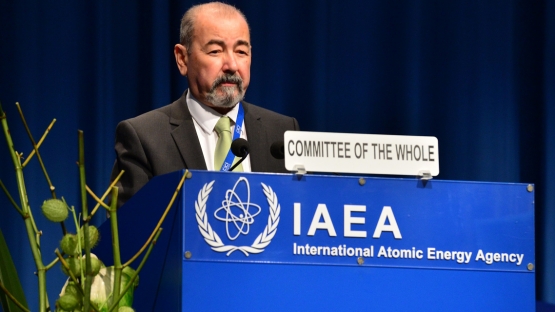During the morning’s plenary session 9 delegations took to the podium, completing the general debate. Their full statements are available here.
The General Conference then elected the eleven countries to serve on the 35-member IAEA Board of Governors for the period 2015-2016. The newly elected Board members are Belarus, Ghana, Republic of Korea, Latvia, Namibia, Pakistan, Paraguay, Philippines, Spain, Turkey and Uruguay.
At the afternoon plenary session, Alumanda M de la Rosa Director of the Philippine Nuclear Research Institute presented the conclusions from the two-day Scientific Forum on Atoms for industry. The forum contributed to a better understanding of how radiation technologies can help to improve industrial processes and boost productivity in an environmentally-sound way, De la Rosa said. She also highlighted the clear links between the IAEA’s work in the areas covered by the forum and the new UN sustainable development goals up for approval in New York next week. (See photos.)
During the afternoon plenary session, delegates adopted a cluster of resolutions related to the IAEA’s budget and operations. This included resolutions on the Agency’s financial statement for 2014; the Agency’s programme and budget for 2016-2017; amendment to Article XIV.A of the Statute; amendment to Article VI of the Statute, scale of assessment of Member State’s contribution to the regular budget; promotion of efficiency and effectiveness of the IAEA decision-making process; and elections to the Agency’s staff pension committee. Two other adopted resolutions addressed measures to further strengthen IAEA activities on nuclear, radiation, transport and waste safety and strengthening the Agency’s technical cooperation activities.
Delegates also adopted a resolution on the application of IAEA safeguards in the Middle East and rejected a resolution on Israeli nuclear capabilities.
The Report on the Fukushima Daiichi Accident — Lessons learned was presented at a side event today and discussions pertaining to the Report took place among the delegates. A press conference took place soon afterwards, chaired by Denis Flory, IAEA Deputy Director General and Head of the Department of Nuclear Safety and Security.
Nuclear Olympiad and Developing a Youth Talent Pipeline was co-hosted by the Department of Management and the Department of Nuclear Sciences and Applications was a first-of-a-kind event for the Agency at which students currently enrolled in universities and secondary schools presented their research about the peaceful uses of nuclear science and technology.
Other side events for Thursday included:
- Telemedicine: Providing Health Services at a Distance focused on telemedicine as a modern tool in radiation medicine, radiation oncology departments networking in India, and the activities of the IAEA in telemedicine.
- Socio-economic Impact of Accelerator-based Research presented the frontier research results where particle accelerators have a unique role in providing analytical information. International experts presented case studies with clear socioeconomic benefits. The topics included: energy applications, exploring provenance and manufacturing methods of biological and cultural heritage items, clean environment, strategic planning and efficient operation of a multi-purpose accelerator facility.
- Water Security in a Changing Climate and the Role of Isotope Hydrology explained the key role of isotope hydrology in building the knowledge base for understanding the impact of climate change on rainfall and on the assessment of groundwater resources.
- European Master of Science in Nuclear Engineering Award Ceremony saw new laureates being awarded a European Master of Science in Nuclear Engineering (EMSNE) Certificate at a side event on the margins of the 59th IAEA General Conference.
- Radiation Medicine in Cancer: Improving Patient Care demonstrated the importance of radiation medicine in the modern management of cancer patients, and the support provided by the IAEA’s Division of Human Health in instituting and/or developing radiation medicine in many Member States.


